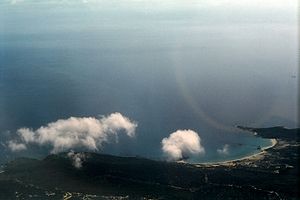Last week, a senior Russian defense official made headlines when he was reported as indicating that Moscow was considering plans to reopen key bases it had during the Cold War, including in Vietnam and Cuba.
In the early 2000s, Russia had scaled back its military presence globally, eventually closing bases at the Lourdes signal intelligence station in Cuba and Vietnam’s Cam Ranh Bay naval base, a deep-water harbor in central Vietnam along the South China Sea.
But speaking last week at the national parliament as lawmakers were about to sign off on an agreement on Russian military presence in Syria, Deputy Defense Minister Nikolai Pankov reportedly said that Russia was “re-rethinking the decisions that were made earlier,” leading some to conclude that Moscow may be moving towards reopening its former bases.
Then, on Friday, Russian President Vladimir Putin’s spokesman, Dmitry Peskov, went on to suggest that the global situation is “in flux,” making it natural for countries to reconsider how changes affected their national interests and the steps they would take to defend them.
“The global situation is not static, it is in flux,” Peskov said, according to Russia’s Interfax news agency. “You see that the last two years have made significant changes to international affairs and security. Therefore, it’s quite natural that all countries assess these changes in line with their national interests and take certain steps in the way they consider appropriate.”
Russian officials have made such comments before with respect to an expanded presence in other countries. But it is not exactly clear what these Russian statements exactly mean with respect to Vietnam in this instance. The most likely reference would have been to the now-restricted naval base at Cam Ranh Bay. As I have noted previously, the United States had used Cam Ranh Bay as a base during the Vietnam War before the then-Soviet Union leased it following the end of the conflict in 1975 (See: “Vietnam Unveils New Port Facility for Foreign Warships in Cam Ranh Bay”).
In that case, Russia has already been negotiating for preferential access to Vietnamese facilities and currently enjoys some privileges that others do not as Hanoi’s top military partner. But allowing a permanent, formal Russian basing presence there in the traditional sense of the term – as opposed to just expanding this preferential access to some degree – would seem to be out of step with Vietnam’s traditional omnidirectional foreign policy approach.
As I have noted previously, Vietnam has long adhered to the “Three Nos” in its defense policy: no military alliances; no foreign bases on Vietnamese soil; no relationships directed against a third party. However, that has not stopped media outlets from speculating over whether there might be a formal basing presence for not only Russia, but also the United States (See: “US Not Seeking ‘Base’ in Vietnam’s Cam Ranh Bay: Envoy”).
Vietnam, for its part, continues to publicly reiterate its traditional stance. On Thursday, Foreign Ministry spokesman Le Hai Binh sought to clarify things at a news briefing by noting Hanoi’s policy of not allowing others to set up bases on Vietnamese soil.
“Vietnam’s consistent policy is not to engage a military ally or engage with any country to oppose a third country,” he said.
“We will also not allow any other countries to set up a military base in Vietnam.”































